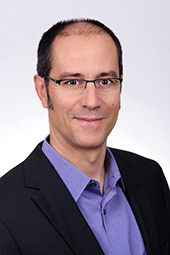Skip to content. | Skip to navigation
Personal tools

- Contact Us |
- Seminars |
- Donate

Lunenfeld-Tanenbaum Research Institute
Mount Sinai Hospital
Joseph & Wolf Lebovic Health Complex
6-1016-2, 25 Orde St.
Toronto Ontario
M5T 3H7
Tel.: 416-586-4800 ext.8377
Fax: 416-586-5993
► Web of Science Researcher ID
L-9092-2018
Dr. Miguel Ramalho-Santos
SENIOR INVESTIGATOR
Dr. Ramalho-Santos grew up in Coimbra, Portugal, and attended the University of Coimbra for an undergraduate degree in Biology and a Masters’ degree in Cell Biology, under the supervision of Dr. Carlos Faro. He moved to the US in 1997 for his PhD at the Department of Molecular and Cellular Biology of Harvard University, where he was co-advised by Drs. Doug Melton and Andy McMahon.
At Harvard he pioneered the transcriptional profiling of mouse stem cells and used mouse genetics to dissect developmental pathways. He received his PhD in 2002 and in 2003 moved to San Francisco to become a UCSF Fellow, an independent research position designed as an alternative to a traditional postdoc. He became an Assistant Professor at UCSF in 2007, and was promoted to Associate Professor in 2013.
In 2018 he was recruited to the Lunenfeld-Tanenbaum Research Institute and the Department of Molecular Genetics at the University of Toronto as the Canada 150 Research Chair in Developmental Epigenetics.
His lab has uncovered key epigenetic control systems that govern early mammalian development and pluripotent stem cell biology. His team discovered that pluripotent stem cells have an open chromatin state that allows for hypertranscription, a phenomenon of global elevation of nascent transcription that supports stem cell expansion. His lab identified the factors that sustain this chromatin state and discovered that it acutely depends on high levels of translational output, providing an elegant tuning of transcription and translation in pluripotent stem cells.
Dr. Ramalho-Santos’ team further discovered new mechanisms by which pluripotent stem cells coordinate environmental cues with cell fate decisions, using an interdisciplinary approach that involves new methodologies in developmental biology, stem cell biology, genomics, epigenetics and bioinformatics. Examples include the discovery that Vitamin C promotes DNA demethylation and the finding that inhibition of mTor induces a reversible state of suspended animation in pluripotent stem cells and blastocysts, whereby they are dormant in their cellular activities but remain capable of giving rise to all cell types of the body. Dr. Ramalho-Santos’ research has broad ranging impact in regenerative medicine, reproductive health, maternal-fetal medicine and cancer.
At a Glance
Studies molecular mechanisms in cells that regulate cell function and division.
Seeks a better understanding of how centrosome-cilia related processes go awry in cancer and other clinically relevant disorders like microcephaly.
Works with the most powerful light microscopes in the world to view proteins working in living cells.
Major Research Activities
Research in Dr. Ramalho-Santos’ lab is organized around 3 principal avenues of inquiry, each of which has several points of synergy with the other avenues:
- How is the transcriptionally permissive chromatin state of pluripotent stem cells regulated, and how does it contribute to hypertranscription and the coordination of developmental progression vs pausing?
- What is the role of transposable elements, generally neglected “dark matter” of the genome, in the regulation of development and stem cell biology?
- How to does the environment impact the epigenetic state and function of pluripotent stem cells?



